The Democratic Delusion Cinematic Universe
Self-styled disrupters aren't committed to real progress. These politicians are only in it for themselves.
I’ve seen this movie before. It always starts with a “new kind of Democrat” — an outsider, a disruptor, a shiny reboot of Hope and Change — and it always ends with the same rolling credits: Regret, disillusionment, and a party rummaging through the rubble asking, “How did we get conned again?” It’s not déjà vu; it’s a franchise. And somehow, Democrats keep pre-ordering the sequel.
Kyrsten Sinema was supposed to be the bold new lead. The first openly bisexual senator. The moral compass who’d guide the party out of its fog. She replaced Jeff Flake and promised integrity. Instead, she turned into a walking TED Talk about “authentic leadership” — minus the authenticity. She shielded the filibuster like it was a family heirloom, cozied up to lobbyists, and built an entire brand around brunch bipartisanship. Even her fashion choices screamed “I’m quirky, not accountable.” Before she even got to Washington, people warned us about her — the opportunism, the self-promotion, the ideological shape-shifting — and she still managed to disappoint on cue.
Then came Eric Adams, New York’s grand experiment in “What if we gave a guy with a federal-sized ethics file the keys to City Hall?” He was marketed as the pragmatic cop-turned-reformer who’d clean up de Blasio’s mess and bring swagger back to the five boroughs. The comparisons to David Dinkins practically wrote themselves — another barrier-breaking Black mayor with a mandate to restore faith in Gotham. But long before he took office, the red flags were already waving like banners over City Hall. The corruption timeline reads like a serialized crime drama, and every new episode features another FBI raid, donor scandal, or sermon about divine destiny. Adams isn’t governing so much as freestyling morality in real time — half preacher, half self-help guru, fully exhausting.
And then, John Fetterman — the hoodie-wearing anti-politician with the aesthetic of a union foreman and the Twitter following of a pop star. He was sold as the everyman who could finally speak to working-class Pennsylvanians. But the authenticity pitch came with fine print. Before his stroke, Malcolm Kenyatta warned that the myth of Fetterman rested on selective memory — like the time he chased down a Black jogger with a shotgun because the man “looked suspicious.” That incident could have been ripped from the George Zimmerman cinematic universe, but Democrats ignored it because he wore Carhartt and dropped his g’s.
When he returned to the Senate, his defenders said he just needed time. Fair enough. But what we got wasn’t recovery — it was rebranding. Suddenly, the tattooed populist from Braddock was dunking on activists and sounding like a centrist podcaster testing material for a Fox News guest slot. He mocked cease-fire protesters, scolding progressives for “purity politics,” and said he’d vote to give Trump the Nobel Peace Prize if he somehow brought peace to the Middle East. The irony wrote itself: the cease-fire didn’t even last a week. Like so many “reformers” before him, Fetterman cashed in his credibility like a campaign check. The problem wasn’t that he changed — it’s that his fans refused to notice.
Now comes Graham Platner — the latest sequel nobody asked for. “From the producers of Sinema, Adams, and Fetterman — comes a new chapter in the Democratic Delusion Cinematic Universe.” The premise? A Democratic Senate candidate from Maine with a chest tattoo that looks suspiciously like the Totenkopf — the skull-and-crossbones insignia worn by Hitler’s SS death squads. Platner, a former Marine, swears he got it in Croatia back in 2007, totally unaware of what it meant. Because nothing says cultural exchange like coming home from Europe with Nazi merch on your ribcage. He later clarified that he thought it just looked “terrifying.” Yeah — so did Hitler.
After days of backlash and an aide quitting in disgust, Platner apologized and promised to remove the tattoo — the political equivalent of promising to “do better” after your third DUI. But even after the apology, he didn’t bother to retract his old Reddit post asking, “Why don’t Black people tip?” He called it a legitimate question. Because nothing says racial sensitivity like turning centuries of economic exploitation into a sociology pop quiz. He explained that one of his Black friends had “walked him through the psychology of it,” as if he’d just finished an ethnography elective called How to Miss the Point 101.
Why Democrats Can’t Afford to Keep Losing the Storytelling War
Speaking as a Democrat myself, I gotta say Democrats are masters of self-sabotage. Only they could look at the political calendar, realize there were 107 days left before facing Donald Trump — a guy who’s basically been running for president nonstop since 2016 — and…
What’s most revealing is the sheer laziness of it. No “I was young,” no “I’ve learned a lot since then.” Just a shrug and a casual yeah, I said it, followed by a token diversity anecdote. He didn’t even bother to pretend to care about how that question landed with Black people — no obligatory “my comments don’t reflect who I am,” no rehearsed empathy tour. Nothing. He skipped the whole PR repentance phase and went straight to the pseudo-psychology, trying to turn a racist stereotype into a social-science theory. The man wasn’t even curious enough to fake curiosity about our perspective. That’s not ignorance; that’s indifference wearing a varsity jacket. It’s the kind of arrogance that thrives in places like Maine, where less than two percent of the population is Black and white guilt is sold in seasonal quantities — usually out of stock by Juneteenth.
Then, right on cue, Bernie Sanders wandered onto the set to defend him. Fox News ran the headline: Sanders calls Platner “a good man” who made “mistakes.” And there it is — the populist immune system rejecting accountability again. Every time I so much as criticize Sanders, his supporters accuse me of being a “Bernie hater.” It’s not true — I like Bernie. I just don’t like how he handles moments like this, when he could easily draw a line between forgivable ignorance and unforgivable stupidity. His message has always been noble, but his movement has a habit of confusing moral absolution with solidarity. Defending Graham Platner isn’t solidarity — it’s brand management. And I can’t wait to see how his supporters spin this one.
This is why I’ve never romanticized populism. It markets itself as a movement of the people, but it’s really a feedback loop of emotional shortcuts that never gets to the root of anything. It flattens every problem into a fairy tale of villains and victims. Swap out the villains — billionaires for immigrants, corporations for journalists — and the script still works, because it’s built to redirect anger, not solve anything. Don’t get me wrong, billionaires absolutely help wreck society, but most of the racism I’ve experienced didn’t come from them — it came from regular folks, the so-called “real America.” I didn’t meet a single billionaire until I started working in politics. Blaming them for every inequity in my life would’ve been convenient, but it wouldn’t have been honest. At some point, I had to look at the hand I was dealt and confront my own reflection. That’s what populism refuses to do — it swaps self-reflection for scapegoats. Platner isn’t an outlier; he’s what happens when a culture worships “authenticity” over accountability, emotion over analysis. He’s the sequel no one asked for but everyone secretly expected.
Maybe his tattoo story is true. Maybe he really was a clueless Marine who wandered into the wrong Croatian tattoo parlor. Maybe he honestly thought the question about Black tippers was a sociological icebreaker. But the fact that he still refuses to say the words I was wrong tells you everything you need to know. He doesn’t think it was racist — he thinks it was misunderstood. And he might even be right that most voters in Maine won’t care. That’s the quiet tragedy of liberal politics in 2025: Democrats claim to be anti-racist but have a shockingly elastic threshold for ignorance when the offender has a “D” next to their name.
The sad thing about all this is that Platner is running against Susan Collins — and he still might be the better option. That’s how low the bar has fallen. Collins has built an entire career on the art of pretending to care. She expresses “concern” the way arsonists talk about fire safety — always after the damage is done. Her decades in Washington are a masterclass in double-speak: opposing cruelty “in spirit” while voting for it in practice. She’s the human embodiment of a shrug, the polite smile that accompanies moral collapse. Every time she furrows her brow, a civil right loses its wings.
If it comes down to Collins and Platner, sure — vote for Platner. But let’s not mistake that for progress. That’s not a victory; that’s triage. It’s the same energy Pennsylvania had when forced to choose between Fetterman and a quack TV doctor. Democracy shouldn’t feel like an IQ test we’re all barely passing. Maine deserves better than a Republican cosplaying as reasonable and a Democrat who thinks Reddit is a safe space for racial introspection.
Anyone who knows me knows how much I hate purity politics. I don’t expect perfection from candidates — I expect growth. People should be allowed to make mistakes and move forward; not everyone deserves the Al Franken treatment. In fact, the way Democrats ousted Franken still stands as one of the most performative and cowardly overreactions in modern politics — a masterclass in self-sabotage disguised as moral high ground. But Platner, like Fetterman, Adams, and Sinema before him, isn’t a story about isolated mistakes. These are fully formed personality traits that were obvious from day one and ignored by a party desperate for optics over integrity. At some point, we have to stop confusing critical thinking with moral rigidity. Calling out a politician’s history of bad faith isn’t “purity” — it’s pattern recognition. It’s refusing to be fooled by the same performance art dressed up as progress.
And that brings us back to the franchise problem. Sinema’s brunch-flavored centrism, Adams’s nightclub sermons, Fetterman’s brand reboot, Platner’s Nazi-adjacent tattoo — all sold as proof that the party’s evolving, when really it’s just recycling the same archetype: the outsider who turns out to be exactly who the insiders warned us about. Democrats keep treating these people like symbols of renewal, but half the time they’re just time bombs with PR teams.
Because at the end of every “new kind of Democrat” story, there’s always the same scene: the credits roll, the audience sighs, and somewhere in the distance, a consultant whispers, “Maybe the next one will be different.”
Spoiler: It won’t be.
Kristoffer Ealy is a political science professor who teaches at California State University Fullerton. He writes The Thinking Class Substack is the author of the upcoming book, Political Illiteracy: Learning the Wrong Lessons.






"Self-styled disrupters aren't committed to real progress. These politicians are only in it for themselves."
Not exclusive to the Democratic party
Performative " politician " is now the head of the country... "maybe we can do better next time"?
Thank you once again Kristoffer- think this guy in Maine is an idiot frankly-and absolutely not what we need. Spouting slogans designed for the TikTok crowd does not a good candidate make. I am not sure he is going to fly in Maine anyway-sincerely hoping that Sherrill and Spanburger in NJ and VA demonstrate the power of hard work rather than showbiz stunts to the Democrats-it is what we need.